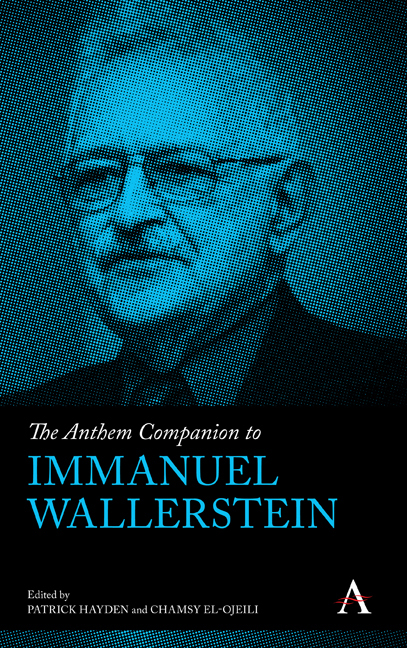Book contents
- Frontmatter
- Contents
- Notes on Contributors
- Acknowledgments
- Chapter 1 “There Is No Such Thing as Sociology”: Wallerstein as Sociologist
- Chapter 2 From Africa to the World: The Sources of Wallerstein’s The Modern World-System
- Chapter 3 Immanuel Wallerstein, World-Systems Analysis and the Structures of Knowledge
- Chapter 4 Wallerstein as International Political Sociologist: On Power, Hegemony and the Interstate System
- Chapter 5 The Agonies of Liberalism: Wallerstein on the Rise and Fall of Liberal Ideology
- Chapter 6 Global Inequalities Avant la Lettre: Theoretical Filiations and Radical Critique
- Chapter 7 Reckoning with Gender in the World-System: Insights from and Challenges to Wallerstein
- Chapter 8 The Past and Future of Antisystemic Movements: Possibilities and Limits of Social Change in Wallerstein’s World-Systems Analysis
- Chapter 9 The Global Environment and Climate Change inthe Modern World-System
- Chapter 10 Pervasive Pandemics: Understanding Global Healthand Disease from a World-Systems Perspective
- Index
Chapter 3 - Immanuel Wallerstein, World-Systems Analysis and the Structures of Knowledge
Published online by Cambridge University Press: 29 February 2024
- Frontmatter
- Contents
- Notes on Contributors
- Acknowledgments
- Chapter 1 “There Is No Such Thing as Sociology”: Wallerstein as Sociologist
- Chapter 2 From Africa to the World: The Sources of Wallerstein’s The Modern World-System
- Chapter 3 Immanuel Wallerstein, World-Systems Analysis and the Structures of Knowledge
- Chapter 4 Wallerstein as International Political Sociologist: On Power, Hegemony and the Interstate System
- Chapter 5 The Agonies of Liberalism: Wallerstein on the Rise and Fall of Liberal Ideology
- Chapter 6 Global Inequalities Avant la Lettre: Theoretical Filiations and Radical Critique
- Chapter 7 Reckoning with Gender in the World-System: Insights from and Challenges to Wallerstein
- Chapter 8 The Past and Future of Antisystemic Movements: Possibilities and Limits of Social Change in Wallerstein’s World-Systems Analysis
- Chapter 9 The Global Environment and Climate Change inthe Modern World-System
- Chapter 10 Pervasive Pandemics: Understanding Global Healthand Disease from a World-Systems Perspective
- Index
Summary
The formalization of the structures of knowledge as the “third arena” of the modern world-system analogous to those of the axial division of labor and the interstate system completes the view of human reality originally offered by Immanuel Wallerstein. This conceptualization accounts for the constitutive structure, secular trends and cyclical rhythms operating in the sociocultural field. It grew out of, indeed was the response to, a series of well-founded critiques of the early outlines of the world-systems perspective. A research proposal drafted for a working group at the Fernand Braudel Center and published in 1977 stated, in the language of the time:
There is a third fundamental aspect to the modern world-system, in addition to the specifically “economic” aspect (division of labor) and the specifically “political” aspect (formation of states). That is the broadly “cultural” aspect which needs to be mentioned, even though little is systematically known about it as an integral aspect of world-historical development. (Hopkins, Wallerstein and Associates 1977, 113)
Hence, the need to integrate the study of large-scale sociocultural questions, clearly implicated in any understanding of historical capitalism, with studies dealing more explicitly with economic or political processes was recognized early on.
From Modernization Theory to World-Systems Analysis
Coming of age during the Cold War, Immanuel Wallerstein became intensely interested in world affairs, and especially anticolonial movements. As a young scholar in the 1950s, he soon began to see himself through the lens of what was then called “political sociology” (Wallerstein 2013, 196) and his academic formation was imbedded in the dominant theoretical/methodological approach to world-scale questions, “modernization.”1 This approach focused on the nation-state as the primary unit in a comparative framework and emphasized “field studies of ‘emerging,’ ‘new,’ ‘non-Western’ nations” (Almond 1966, 96). However, it also embraced issues of large-scale inequality, which linked social scientists with policy planners harboring Cold War agendas such as alliance formations.
Criticisms brought to light the shortcomings of the modernization approach as theory and for its Eurocentric and ideological underpinnings. Practitioners posited a developmental hierarchy through which societies passed, a generalized historical trajectory, with contemporary Western social organization typified by capitalism/industrialism and (representative) democracy indicating the direction and end point of the development of all societies, including, then, what was known as the Third World.
- Type
- Chapter
- Information
- The Anthem Companion to Immanuel Wallerstein , pp. 37 - 56Publisher: Anthem PressPrint publication year: 2023



